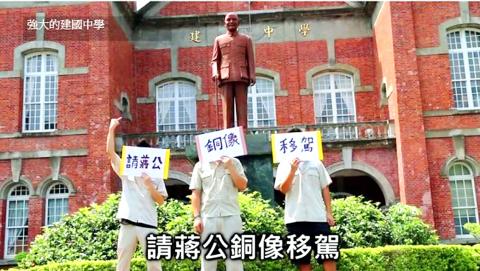A group of high-school students from across the nation has launched a campaign advocating the removal of statues of Chiang Kai-shek (蔣介石) from all campuses nationwide, announcing their initiative through a video released on Monday.
Taipei Chenggong High School (成功高中) started filming the clip and was later joined by various high schools, including Taipei Municipal Jianguo High School (建國中學), Taipei First Girls’ High School (北一女中), the Affiliated Senior High School of National Taiwan Normal University (師大附中), National Tainan Girls’ Senior High School (台南女中) and St Ignatius High School (徐匯中學).
The video’s release was timed to coincide with the 27th anniversary of the end of the Martial Law era on July 14, 1987.

Photo taken from YouTube
Titled 7/14 Beginning of our modern democracy, banish all Chiang statues from school campuses, students say in the three-minute video that it is time to do away with reverence for Chiang’s authoritarian rule at schools.
They joined up with fellow students currently enrolled at several leading high schools. Filmed on location, the video aims to show viewers that at these schools, statues of Chiang, symbols of his authoritarian rule and the Martial Law era are still displayed prominently.
Holding placards, the students are seen standing in front of a Chiang statue at Taipei Municipal Jianguo High School saying: “July 14. On this day, the government order to abolish martial law was made. It marked the end of authoritarian rule and the start of Taiwan’s modern democracy.”
“Although the era of authoritarian rule has ended, its legacy in the form of Chiang Kai-shek statues is still in place at many schools and university campuses. We believe it’s time to remove them from all schools so ‘transitional justice’ can be achieved,” they say in the video.
“After July 14, we have our current democracy, freedom and human rights. These were fought for and gained by the democracy activists of yesteryear. Let us all commemorate this day together,” they add.
“Although Chiang made contributions to the Republic of China [ROC], he imposed martial law and the ‘White Terror,’ severely violated human rights and repressed democracy and freedom. All these are contrary to the ideals of ROC founding father Sun Yat-sen (孫中山),” the students added.
“Why is Hitler repudiated by people everywhere, but Chiang Kai-shek is still worshiped here? We do not have to track down who was responsible for past crimes, but why does Chiang’s statue still stand at schools? The man denied the people democracy, freedom and human rights. Why should people pay respect to him?” they said.
Near its end, the video lists the names of victims of Chiang’s White Terror era, while the song used by the government to commemorate the late leader plays ironically.
The students said they want Taiwanese to remember that the democracy they enjoy today was won by the blood, sweat and sacrifice of many activists.
“We can forgive, but must not forget history. The fight against authoritarianism starts on school campuses. So let’s remove all Chiang’s statues from schools,” they said.

The CIA has a message for Chinese government officials worried about their place in Chinese President Xi Jinping’s (習近平) government: Come work with us. The agency released two Mandarin-language videos on social media on Thursday inviting disgruntled officials to contact the CIA. The recruitment videos posted on YouTube and X racked up more than 5 million views combined in their first day. The outreach comes as CIA Director John Ratcliffe has vowed to boost the agency’s use of intelligence from human sources and its focus on China, which has recently targeted US officials with its own espionage operations. The videos are “aimed at

STEADFAST FRIEND: The bills encourage increased Taiwan-US engagement and address China’s distortion of UN Resolution 2758 to isolate Taiwan internationally The Presidential Office yesterday thanked the US House of Representatives for unanimously passing two Taiwan-related bills highlighting its solid support for Taiwan’s democracy and global participation, and for deepening bilateral relations. One of the bills, the Taiwan Assurance Implementation Act, requires the US Department of State to periodically review its guidelines for engagement with Taiwan, and report to the US Congress on the guidelines and plans to lift self-imposed limitations on US-Taiwan engagement. The other bill is the Taiwan International Solidarity Act, which clarifies that UN Resolution 2758 does not address the issue of the representation of Taiwan or its people in

US Indo-Pacific Commander Admiral Samuel Paparo on Friday expressed concern over the rate at which China is diversifying its military exercises, the Financial Times (FT) reported on Saturday. “The rates of change on the depth and breadth of their exercises is the one non-linear effect that I’ve seen in the last year that wakes me up at night or keeps me up at night,” Paparo was quoted by FT as saying while attending the annual Sedona Forum at the McCain Institute in Arizona. Paparo also expressed concern over the speed with which China was expanding its military. While the US

SHIFT: Taiwan’s better-than-expected first-quarter GDP and signs of weakness in the US have driven global capital back to emerging markets, the central bank head said The central bank yesterday blamed market speculation for the steep rise in the local currency, and urged exporters and financial institutions to stay calm and stop panic sell-offs to avoid hurting their own profitability. The nation’s top monetary policymaker said that it would step in, if necessary, to maintain order and stability in the foreign exchange market. The remarks came as the NT dollar yesterday closed up NT$0.919 to NT$30.145 against the US dollar in Taipei trading, after rising as high as NT$29.59 in intraday trading. The local currency has surged 5.85 percent against the greenback over the past two sessions, central